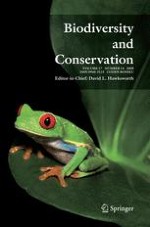01-12-2008 | Original Paper
Trends and prospects for local knowledge in ecological and conservation research and monitoring
Published in: Biodiversity and Conservation | Issue 14/2008
Log inActivate our intelligent search to find suitable subject content or patents.
Select sections of text to find matching patents with Artificial Intelligence. powered by
Select sections of text to find additional relevant content using AI-assisted search. powered by
